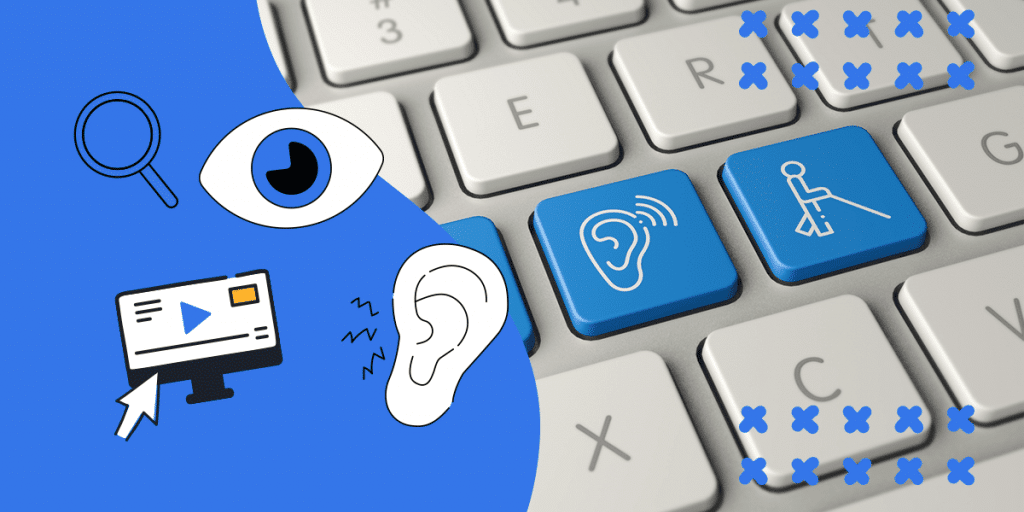Digital Accessibility: What marketers need to know ?
Teams working in digital marketing are frequently judged on metrics like engagement, traffic, conversions, and lead creation. However, they aren’t frequently evaluated based on how accessible their activities are, which can be detrimental to your brand’s reputation, SEO, and conversion rates.
All users, including those with temporary or permanent disabilities, can use websites and digital communications thanks to accessibility, often known as inclusive or universal design. As digital marketers, we must assist firms in figuring out how to treat their customers fairly and sympathetically. Starting with accessibility is a terrific idea.
What does “digital accessibility” mean?
Making websites, tools, and technologies as accessible as possible to everyone, including those with disabilities, is known as web accessibility.
When creating accessible websites and digital media, the following sorts of disabilities should be taken into account:
- Low eyesight and blindness
- Hearing loss and deafness
- Physical restrictions; speech impairments; neurological conditions (such as Alzheimer’s, Parkinson’s, etc.)
- Cognitive constraints (e.g., learning disabilities)
A variety of design and web development techniques can be used to create an accessible website that makes it easier for users with impairments to explore the site. For instance, you may make it simpler for those with low vision to see the content on your website by making sure there is enough color contrast between the text and background colors. The term “digital accessibility” refers to a range of digital media, including kiosks, mobile apps, electronic documents, video, and audio content. It also includes web accessibility.
It offers accessibility for people with impairments as well as for everyone else, enabling them to interact with the information. In addition to the apparent benefit of providing information that is accessible to all and the legal ramifications, embracing accessibility has other advantages for your company. Building an accessible website benefits your brand’s reputation and the site’s usability, but it also increases user loyalty and engagement.
How significant is accessibility on the web today?
The World Bank estimates that 15% of people worldwide have some kind of handicap. These same individuals might need to access and use your website at any moment of the day. Individuals with disabilities, on the other hand, may find it extremely difficult or even impossible to use your website if it is not fully accessible. These days, more people are looking for online services and transactions. As a result, it is more important than ever to make sure that your website and other digital tools are accessible.
Motivations for making it a top priority
Everyone will benefit from a positive user experience on your site if it is accessible. To avoid penalties and legal action, it’s also critical to adhere to the website accessibility guidelines. By adhering to your state’s or nation’s accessibility laws, you can reduce your risk of legal issues.
The following laws need your attention:
- The Restoration Act of 1973’s Section 508
- The Americans with Impairments Act
- The Accessibility for Ontarians and the
- European Union web content accessibility guidelines
The SEO benefits of having easily accessible websites
Better SEO is another benefit of having an accessible website, in addition to making sure it is usable for those with impairments.
- Improved user encounter: A website that is fully accessible reflects the s universal design. Sites that are accessible offer a positive user experience, and search engines are reusable.
- Easily reaching the intended audience: You have a better chance of connecting with your target audience when your website is accessible.
- Improved search outcomes: Standards and practices for web accessibility are analogous to effective SEO techniques that improve search results. Sitemaps, semantic HTML, page titles, correct headers, and alternative text are a few of them.
Conclude
Web accessibility is crucial for the expansion and success of any company, especially in the current digital age. You can save money on legal fees by having an accessible website and digital resources. You can also attract more customers and improve their shopping experience. Accessibility issues are getting worse. To truly reach as many people as possible with our content, we, as marketers, need to consider accessibility.
We need to start putting more emphasis on accessibility if we want to improve the internet for everyone. That entails prioritizing accessibility when producing and designing. By making your material more accessible, you’ll ensure that it reaches the widest possible audience and contribute to closing the digital divide. We are a leading web development and design firm. We design attractive, user-friendly websites that both sound technically and graphically appealing.
We’ll collaborate with you to develop a strong online brand experience for your business. You need to make sure your website leaves a strong first impression in this digital age. Your website serves as a constant online advertisement for your business, so you want it to be as effective as possible. We are aware of the importance of having a great website that works well on all devices and draws in customers.
Your website’s rankings, traffic, and lead creation can all be enhanced by HDI’s offshore SEO and digital marketing experts. Our professionals give your project their full attention to ensure exceptional positive results. We offer a wide range of digital services, including web design, development, and lead generation for SEM. To find out more about our digital marketing team, get in touch with us at hditechnology.in








